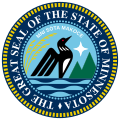November 2, 1976 | |||||||||||||||||||||
| |||||||||||||||||||||
 County results Humphrey: 50–60% 60–70% 70–80% 80–90% | |||||||||||||||||||||
| |||||||||||||||||||||
| Elections in Minnesota |
|---|
 |
The 1976 United States Senate election in Minnesota took place on November 2, 1976. Incumbent Democratic U.S. Senator Hubert Humphrey won re-election to a fifth term. This is the last U.S. Senate election in which a candidate won all of Minnesota's 87 counties.
Contents
- Democratic–Farmer–Labor primary
- Candidates
- Results
- Independent-Republican primary
- Candidates 2
- Results 2
- General election
- Results 3
- See also
- References
Humphrey would die in office a little over a year later in January 1978.


